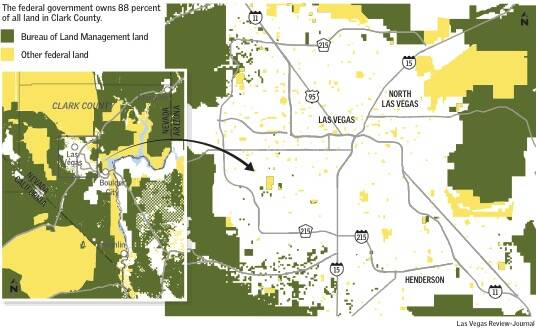It’s not praiseworthy to take a man’s life savings and then give him $20 for dinner. Yet, that’s what the federal government wants you to do when it doles out small parcels of land for development.
This month, the Bureau of Land Management announced it was ridding itself of 20 acres in southwest Las Vegas. Rep. Dina Titus noted that the land will cost a mere $100 an acre and will be used to build “nearly 150 affordable homes.”
This is nice, but it’s political posturing to pretend this move is more than a drop in the bucket.
What it does show is that high land prices contribute to high housing prices. A natural way to lower prices is to increase supply. An influx of land available for development would do just that.
Good news. Las Vegas is surrounded by empty land that could be developed except for one thing: The federal government “owns” most of it. Washington controls around 85 percent of the land in Nevada, or 60 million acres. The BLM oversees around two-thirds of the state, more than 47 million acres.
Congress passed the bipartisan Southern Nevada Public Land Management Act in 1998. Over the past 26 years, it has prompted the federal government to release more than 32,000 acres. That’s significant. But there’s still much more real estate in the Las Vegas area that should be made available.
Nevada has it the worst, but all Western states are burdened by the federal government controlling a disproportionate share of their land. In the 31 states east of or bordering the Mississippi River, the federal government controls 61 million acres. That’s nearly the equivalent of what it oversees in this entire state.
Nevada isn’t on equivalent standing with its peers despite Congress’ repeated promised in the 1860s to do just that. In 1864, Congress made a motion to admit Nevada into the union “on an equal footing with the original States.”
Supporters of federal land ownership will note that Nevada’s enabling act said the state would “forever disclaim all right and title” to its public lands.
But as Nevada Policy’s Steve Miller explained in his Broken Compact report, that language wasn’t unique to Nevada. “Virtually all American enabling acts have such disclaimer clauses, going all the way back to the Northwest Ordinance of 1787.”
The reason is that such language actually cleared title to the land, which allowed it to be sold. Later in Nevada’s enabling act, it also states the public lands “shall be sold by the United States.”
That happened in most other states – and not just 20 acres at a time. Give Nevadans back more of the state’s land.

